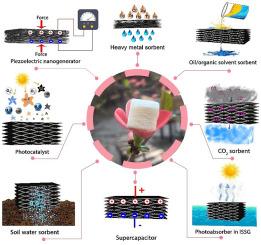功能化木海绵:用于可再生能源、淡水生产、能源储存和环境修复的先进生物质材料
IF 16.3
1区 工程技术
Q1 ENERGY & FUELS
引用次数: 0
摘要
生物质材料对于开发可再生能源和环境修复应用至关重要。木海绵(WS)是一种多孔材料,具有分层结构、优异的物理化学稳定性、大表面积和低导热性,在废水处理、储能装置、应变传感器、二氧化碳吸附以及通过淡化苦咸水资源和从土壤中提取水而生产淡水等领域的实际应用中显示出巨大的潜力。本研究概述了 WS 的制备策略和表征,以及最近令人印象深刻的应用,重点关注可再生能源和环境可持续性。研究还探讨了 WS 未来的潜在应用方向,如用作大气水收集吸附剂、融入建筑材料以提高隔热性能和能源效率,以及用作微生物生长基质以进行生物修复等。最后,还讨论了使用 WS 所面临的挑战。本文章由计算机程序翻译,如有差异,请以英文原文为准。

Functionalized wood sponges: Advanced biomass materials for renewable energies, freshwater production, energy storage, and environmental remediation
Biomass-based materials are crucial for the development of renewable energy and environmental remediation applications. Wood sponge (WS), a porous material with a hierarchically structured architecture, excellent physicochemical stability, large surface area, and low thermal conductivity has shown great potential for practical applications in wastewater treatment, energy storage devices, strain sensors, CO2 sorption, and freshwater production through desalination of brackish water resources and extraction of water from soil. This study provides an overview of the preparation strategies and characterization of WS, as well as recent impressive applications, with a focus on renewable energy and environmental sustainability. Potential future directions for WS applications, such as its use as an atmospheric water harvesting sorbent, integration into building materials to improve their thermal insulation and energy efficiency, and as a substrate for the growth of microorganisms for bioremediation applications are explored. Finally, the challenges of using WS are discussed.
求助全文
通过发布文献求助,成功后即可免费获取论文全文。
去求助
来源期刊

Renewable and Sustainable Energy Reviews
工程技术-能源与燃料
CiteScore
31.20
自引率
5.70%
发文量
1055
审稿时长
62 days
期刊介绍:
The mission of Renewable and Sustainable Energy Reviews is to disseminate the most compelling and pertinent critical insights in renewable and sustainable energy, fostering collaboration among the research community, private sector, and policy and decision makers. The journal aims to exchange challenges, solutions, innovative concepts, and technologies, contributing to sustainable development, the transition to a low-carbon future, and the attainment of emissions targets outlined by the United Nations Framework Convention on Climate Change.
Renewable and Sustainable Energy Reviews publishes a diverse range of content, including review papers, original research, case studies, and analyses of new technologies, all featuring a substantial review component such as critique, comparison, or analysis. Introducing a distinctive paper type, Expert Insights, the journal presents commissioned mini-reviews authored by field leaders, addressing topics of significant interest. Case studies undergo consideration only if they showcase the work's applicability to other regions or contribute valuable insights to the broader field of renewable and sustainable energy. Notably, a bibliographic or literature review lacking critical analysis is deemed unsuitable for publication.
 求助内容:
求助内容: 应助结果提醒方式:
应助结果提醒方式:


